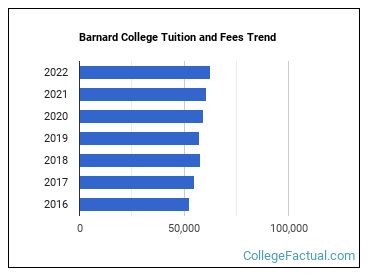 by our College Data Analytics Team
by our College Data Analytics TeamSee current and projected tuition and fees for Barnard College, and how those expenses constrast to nationwide and regional averages. If you're looking for specific information on Barnard costs, you can go to any of the following sections:
The average tuition and fees at Barnard College for undergraduates was $59,687 a year in 2020-2021. Students from New York did not receive a discount.
| Tuition | Fees | Total | |
|---|---|---|---|
| Tuition & Fees | $57,734 | $1,953 | $59,687 |
Barnard tuition and fees is for one year of attendance, not including room and board.
Remeber that many students qualify for scholarships and financial aid that will lower the amount they have to pay.
How much does Barnard College cost for part-time students?
Go to the Cost Per Credit Hour page for details.
The national out-of-state average for tuition and fees is $19,933 a year. Barnard College is fairly expensive when compared to other schools across the United States. It's yearly out-of-state tuition and fees costs for undergrads is $59,687. Note that Barnard does not give any in-state discounts.
If you want to know how Barnard compares to other schools in the nation, in the region, and in the state, see the chart below.
| Nationwide | Middle Atlantic | New York | |
|---|---|---|---|
| Tuition & Fees | Expensive | Expensive | Expensive |
Note that a school may appear to be more expensive than another school when you look at tuition and fees alone, but it may actually be a better deal when you factor in financial aid packages. For more details on that, see: Barnard College Financial Aid.
Over the past five years, Barnard tuition and fees has grown by a rate of 2.76% annually. The tuition increased by 2.76%, and fees by 2.76%. The estimated cost for this year's tuition and fees is $63,032 if the growth rate continues.
For two years of academic instruction, your cost will end up being $127,805 for two years and $262,773 for four years.
Remeber to factor in additional costs such as room and board, transportation or books.
The following chart shows projected upcoming tuition and fees for undergraduates at Barnard.

Unless your school has advertised price freezes, it is likely the cost of tuition and fees will go up every year. Make sure you factor this into your budget.
Get some answers to the most frequently asked college finance questions.